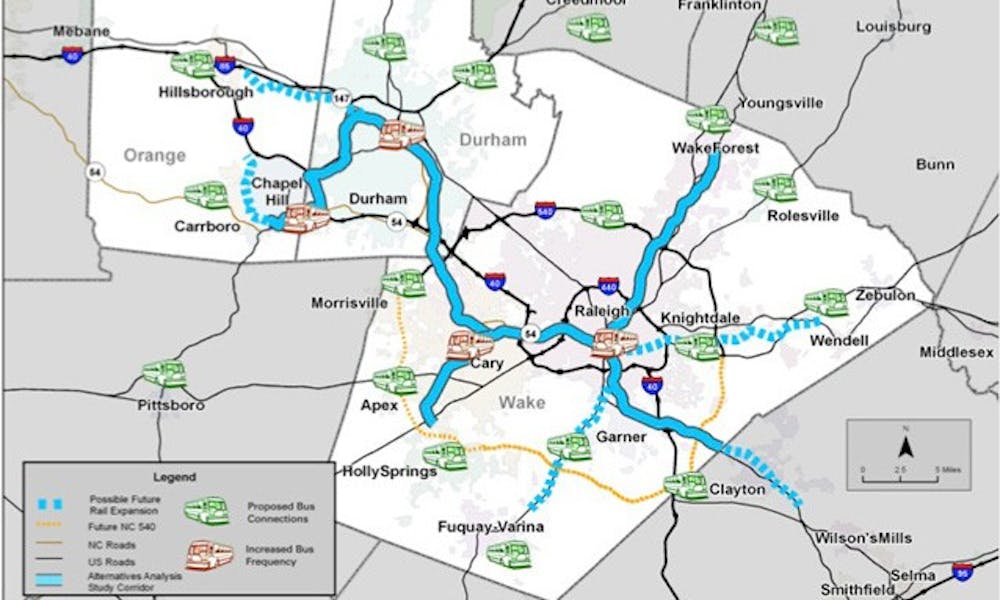Many members of the Duke and Durham communities have found themselves stopped at the intersection on Swift Avenue and West Main Street, waiting for a churning freight train to clear the tracks.
The Triangle Regional Transit Program is considering new plans to develop an efficient and sustainable regional transportation system. Many different possibilities for improvement are under evaluation, including the development of a new light rail train system.
As a part of its long-range transportation plan, so far TRTP has looked at and analyzed roughly 80 miles of rail corridor, which runs throughout Orange County, Durham County and Wake County. TRTP is now trying to hear the public’s opinion. As part of this effort to inform and interact, officials are hosting public workshops throughout the Triangle.
At a public workshop in the Durham Station Transportation Center Tuesday, however, not everyone was sold on the idea of expanding the transit system.
“The bus system you have already is not working, because you’re not doing what you said you were going to do... This is not Charlotte, this is not New York, this is Durham, North Carolina.,” resident James Chavis said.
Several residents attending the forum noted that they took issue with plans to put in a rail system, when the current bus system does not extend into all the different neighborhoods of Durham.
Others noted that passengers on Durham bus routes have to pass through Duke. Pointing to the map on display, one citizen complained that the vast majority of the public transport system runs past Duke, and through the professional centers of downtown Durham. The network of buses barely extends itself into northern, southern and eastern Durham.
Another Durham resident, Andrea Wilson, cited problems with the reliability of public transportation.
“We have to deal with what’s going on now,” Wilson said. “The bus system that we have is down in the dumps, man. It’s horrible. I am a regular, for two and a half years, I have not had a car. I had to run to the bus yesterday morning because the bus was five minutes early. And a lot of times they are 10, 15, 20 minutes late. We are going through a lot of being late. On the regular, three or four buses, late!”
Despite worries, TRTP said it will not add a new train system without working to improve the current bus system.
Senior Project Manager Bill Houppermans said the Triangle Transit Program just completed its corridor systems study, narrowing down 80 miles of corridor to about 18 miles.
“.... We want to implement the most efficient starter line possible that would breed success. That’s a success story that has happened in other cities. You get a good starter line and then it grows from there because people realize how valuable it is to the community. ”
As for the citizens’ concerns over the bus system, Houppermans said the Triangle Transit Program is working with the Metropolitan Planning Organization to “find the right size of the rail investment versus the bus investment.” He added that it is important to spend money in the most effective way on this project, whether on bus routes or rail lines.
“We need the more enhanced express bus service, so that the buses aren’t competing during rush hour. And we need a bus service that could feed the light rail, because buses feeding a rail system frees up other resources. Instead of running the whole length around the city, the bus route can be redeployed to serve a whole community that’s not being served right now.
Houpperman said this project will first try to improve “the things that are not working right now.” He encouraged people with complaints to voice their concerns.
“Let us know where you think the most benefit for the bus system is, and, gosh darn, we’ll get that into the plan.”
TRTP will be holding its last public workshop tonight from 4 to 7 p.m., at the Garner Historic Auditorium, in southern Wake County. There will be several presentations, and the opportunity to engage with politicians in one-on-one conversation.
People can also voice their opinions by calling 1-800-816-7817, or by sending an e-mail to info@ourtransitfuture.com.
Get The Chronicle straight to your inbox
Sign up for our weekly newsletter. Cancel at any time.

